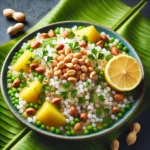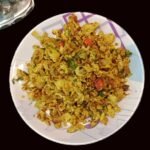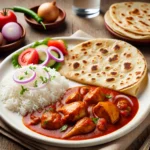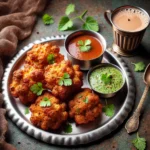In today’s world, finding healthy protein sources is very important. It helps fight obesity and chronic diseases. Through my health journey, I learned that the right foods do more than just fill you up. They are the base of a healthy body.

Key Takeaways
- Understanding the multifunctional role of protein in maintaining overall health
- Identifying nutritious high protein foods that cater to both taste and well-being
- Exploring a variety of protein-rich diet options to suit individual dietary preferences
- Recognizing the benefits of incorporating healthy protein sources into daily meals
- Acknowledging the link between adequate protein intake and disease prevention
- Appreciating the importance of balanced nutrition for long-term weight management
Understanding the Importance of Protein in Your Diet
Protein is key for good health. It helps build and fix cells in our bodies. Eating enough protein keeps us healthy and well for a long time.
Protein’s Role in Health and Disease Prevention
Protein helps our immune system work right, keeps metabolism fast, and fixes cells. It’s linked to protein for health and fighting diseases. Eating enough protein helps keep us from getting sick.
Essential Amino Acids and Your Body
Our bodies can’t make some amino acids on their own. We need to get them from food. These amino acids are important for making enzymes and hormones that keep us healthy.
Weight Loss and Protein Intake
Eating protein can help with protein and weight loss. Protein makes us feel full, so we eat less. This helps with weight control and keeps muscle mass while losing weight.
| Essential Amino Acid | Role in the Body | Sources of Protein |
|---|---|---|
| Lysine | Supports immune function | Poultry, red meat, soybeans |
| Methionine | Necessary for cell growth and repair | Seafood, seeds, eggs |
| Phenylalanine | Required for neurotransmitter development | Dairy, nuts, beans |
| Threonine | Keeps connective tissues and muscles strong | Cottage cheese, lentils, pork |
| Valine | Promotes muscle recovery and growth | Mushrooms, peanuts, whole grains |
My Selection of Top Animal-Based High Protein Foods
I always pick salmon, Greek yogurt, and chicken for my diet. They are great for health and taste. They help me keep my diet balanced and full of protein.
The Nutritional Benefits of Salmon
Salmon is not only delicious but also very healthy. It’s full of omega-3 fatty acids. These acids help keep your heart healthy and make your brain work better.
Salmon also has lots of B vitamins and selenium. Eating about 3 ounces of salmon gives you 22 grams of protein. That’s why it’s a top choice for boosting protein.
Greek Yogurt: A Creamy Protein Powerhouse
Greek yogurt is another favorite of mine. It’s smooth and can be eaten for breakfast or after working out. It has a lot of protein, about 20 grams in a 7-ounce serving.
This makes it great for filling me up and meeting my protein needs. It also has calcium and B vitamins, making it even more nutritious.
Chicken: Lean Protein for Everyday Meals
Chicken is a must-have in my kitchen. It’s full of protein and can be used in many dishes. A 4-ounce serving of lean chicken breast has about 24 grams of protein.
Chicken also has phosphorus, vitamin B6, and selenium. These nutrients make it a great choice for anyone looking to stay healthy.
| Food Item | Protein Content | Key Nutrients |
|---|---|---|
| Salmon (3 oz) | 22g | Omega-3 Fatty Acids, B Vitamins, Selenium |
| Greek Yogurt (7 oz) | 20g | Calcium, B Vitamins |
| Chicken Breast (4 oz) | 24g | Phosphorus, Vitamin B6, Selenium |

Plant-Based Proteins: A Guide to Vegan and Vegetarian Options
I’ve learned a lot about vegan protein sources and vegetarian high protein foods. Eating plant-based is good for me and the planet. Lentils and chickpeas are my go-to foods for plant-based protein choices.

Lentils have about 18 grams of protein per cup. They’re good for your gut and help keep your blood sugar stable. Chickpeas have 14.5 grams of protein per cup. They’re perfect for many dishes, from salads to curries.
- Lentils: essential for protein intake and rich in fiber.
- Chickpeas (Garbanzo beans): excellent for protein and helps with blood sugar control.
- Soy protein powder: a versatile ingredient that supports muscle health and may reduce health risks.
Adding different vegetarian high protein foods to your diet is good for now and the future. It makes eating fun and keeps you healthy. If you’re new to vegan or vegetarian, trying these plant-based protein choices can make a big difference.
Navigating Protein Recommendations: How Much Do You Really Need?
Knowing how much protein you need every day is key to eating well. The National Academies of Medicine say adults should get 10%-35% of their calories from protein. That means at least 0.8 grams of protein for every kilogram of your weight. But, your needs can change based on your life, weight, and health.
If you’re active like me, you might need more protein than someone who sits a lot. Whether you want to build muscle, lose weight, or just eat right, adjusting your protein is important. It helps you reach your health goals and stay active.
| Activity Level | Daily Protein Needs (grams/kg of body weight) |
|---|---|
| Sedentary | 0.8 |
| Moderately Active | 1.0 – 1.2 |
| Highly Active | 1.2 – 2.0 |
To hit my protein dietary guidelines, I eat a mix of high protein foods. It’s important to think about both how much and what kind of protein you eat. I eat everything from lentils to chicken and salmon.

Getting the right amount of protein is crucial for your health goals. Always talk to a doctor or a nutritionist to make sure your diet fits your needs and life.
Curating Protein-Rich Meals: Insights from Nutrition Experts
I’ve learned a lot from nutrition experts on adding high-protein foods to our meals. They suggest eating nutritious meals with salmon and the benefits of Greek yogurt. This can really boost your diet.
Incorporating Salmon into Your Diet
Salmon is very versatile, making it great for meal planning with protein. You can grill, bake, or add it to salads. It gives you lots of protein and omega-3 fatty acids, which are good for your heart.
Why Greek Yogurt Is a Must-Have
Greek yogurt benefits your body in many ways. It’s full of protein and probiotics, helping with muscle recovery and digestion. You can use it in smoothies or as a healthier cream substitute in recipes.
Transforming Meals With Chicken
Chicken is key in protein-rich diets. You can grill it and serve it on greens or make spicy stir-fries. It fits well in many cuisines, making it a great choice for meals.
Lentils: Versatile and Nutrient-Dense
Lentils in diet are very important because they’re full of protein and fiber. They’re great as a meat substitute in tacos or burgers. They also add nutrition to soups, making them more filling.
| Ingredient | Protein Content | Meal Ideas |
|---|---|---|
| Salmon | 20g per 3 oz | Grilled Salmon, Salmon Caesar Salad |
| Greek Yogurt | 10g per 100g | Yogurt Parfait, Smoothie Bowls |
| Chicken | 25g per 3 oz | Chicken Stir-fry, Barbecue Chicken |
| Lentils | 9g per 100g | Lentil Soup, Lentil Burgers |
The Role of Protein Supplements and Powders
For many, protein supplements can change the game. They help if you don’t get enough protein from food. Whey protein is great for athletes to fix muscles. Plant-based protein powders are good for vegans. The right one can really help with protein.
Not all protein supplements are the same. Choosing the right one is key to reaching your health goals. It’s not just about getting more protein. It’s about adding to your diet in a way that fits your health beliefs and needs.
Choosing Quality Protein Supplements
I look closely at protein supplements labels. I avoid those with added sugars, fillers, or fake flavors. Good quality means pure and little processing. I like brands that show they are tested by others or have certifications. This makes sure the label matches the product.
Integrating Supplements into Your Daily Routine
Adding whey protein or plant-based protein powders to my day took some trying. Now, I use them in smoothies in the morning or after working out. But, I remember they should not replace whole foods. They should add to a diet full of nutrients for good health.
If you’re an athlete, have dietary limits, or want more protein, protein supplements can be a big help. They are useful and effective if used right. Just make sure they fit with a balanced diet.
Recognizing and Addressing Protein Deficiency
Protein deficiency is rare in a balanced American diet. But, it can still happen. Knowing the effects of low protein intake is key to staying healthy. Here are some symptoms of protein deficiency to watch for.
- Brittle hair and nails
- Weakness or muscle loss
- Difficulty concentrating or feeling moody
- Constant hunger despite regular eating
If you see these signs, check your eating habits. You might need to talk to a doctor. I make sure to eat foods high in protein every day to avoid these problems.
Changing your diet can really help with symptoms of protein deficiency. Eating more protein-rich foods like chicken, salmon, or lentils can help. But, it’s smart to talk to nutrition experts to make sure your diet is good for you.
Listening to your body and watching your health is important. Eating different proteins has made me feel stronger and more energetic. If you think you’re not getting enough protein, change your diet or talk to a dietitian.
The Satiety Factor: High Protein Foods for Appetite Control
Learning about protein for satiety is key for managing hunger and staying healthy. Proteins help build muscles and also help us feel full. This makes us snack less and stay healthy.
How Protein Influences Fullness and Snacking Habits
Adding more protein to my meals cuts down my snacking. Protein controls the hormones that tell our brain we’re full. This helps us eat less and manage our weight better.
High Protein Snacks to Keep Hunger at Bay
Choosing the right snacks helps me stay full all day. Options like unsalted nuts or whole-grain crackers with cheese are tasty and keep me going. Don’t forget about a spoonful of peanut butter for extra protein and healthy fats.
- Unsalted nuts
- Whole-grain crackers with cheese
- Peanut butter
These snacks help keep hunger away and give me the energy I need until my next meal.
Eating a diet full of high-protein foods is good for muscles and helps us feel full. It’s a great way to control our eating and stay healthy.
Conclusion
We’ve looked into the world of high protein foods and seen how important they are. They help with muscle growth, keep us full, and keep us healthy. Foods like salmon, Greek yogurt, and lentils are great choices for balanced nutrition.
It’s easy to find protein-rich dietary choices that fit everyone’s taste and needs. This makes it simple to get the health benefits of protein. It’s not just about eating to stay full. It’s about feeling good and living well.
Knowing what your body needs is key to a healthy diet. Experts say protein is important for staying healthy. It helps with hunger and keeps you strong.
Think about how protein can be a big part of a healthy diet. Try different foods and enjoy getting healthier. Every protein-rich meal brings you closer to feeling better and more energetic.
FAQ
What roles does protein play in health and disease prevention?
Protein is key for muscle and bone health. It helps make enzymes, hormones, and boosts the immune system. It also supports growth and keeps muscle mass healthy. Plus, it helps control blood sugar levels.
Protein makes you feel full, which can help prevent obesity.
Why are essential amino acids important for my body?
Essential amino acids are needed because our bodies can’t make them. They’re vital for healthy cells, enzymes, and hormones. Eating a variety of protein-rich foods gives you all the amino acids you need.
Can increasing protein intake aid in weight loss?
Yes, protein can make you feel full longer. It takes more time to digest than carbs or fat. This can help you eat less and manage your weight better.
How can I incorporate salmon into my protein-rich diet?
You can eat salmon in salads, sandwiches, or grilled. It’s packed with protein and omega-3 fatty acids. These are great for your heart.
What are some plant-based protein options for vegans and vegetarians?
Lentils, chickpeas, and soy products are great for vegans and vegetarians. They’re full of protein, fiber, vitamins, and minerals. They make a healthy choice for your diet.
What are the daily protein intake recommendations?
Adults should get 10%-35% of their daily calories from protein. That means at least 0.8 grams per kilogram of body weight. Your needs may change based on your activity level and health goals.
What should I look for when choosing protein supplements?
Choose protein supplements with little sugar, no fillers, and no artificial flavors. Look for third-party testing or certification to ensure they’re safe and quality.
What are the symptoms of protein deficiency?
Not getting enough protein can cause brittle nails, mood swings, weak muscles, and a weak immune system. If you notice these symptoms, talk to a health expert to check your diet and protein intake.
How can protein-rich foods help with appetite control?
Protein-rich foods keep you feeling full longer. This can reduce snacking and help with appetite control. It can also balance your calorie intake and support weight management.










